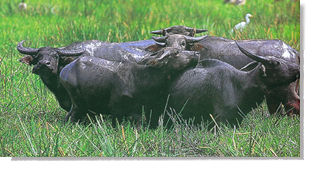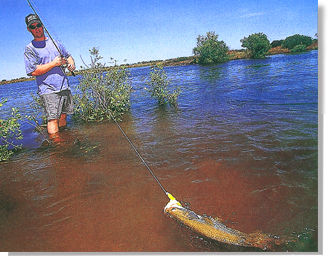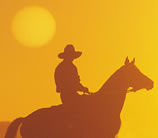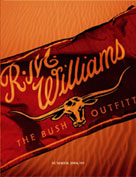ADVENTURE
Our answer to Africa
Story and photos David Hancock
 The
northern wet season is just about over. Crocodiles and goannas are out on
the floodplains getting fat on magpie geese and their eggs, while the entire
Top End is alive with colour and tucker.
The
northern wet season is just about over. Crocodiles and goannas are out on
the floodplains getting fat on magpie geese and their eggs, while the entire
Top End is alive with colour and tucker.
It's been a good start to the year - the Mary River delta is waterlogged, the wildlife is thriving and Tom Starr is contemplating American tourists and a good exchange rate. The former buffalo farmer-cum-tourism operator just loves the northern "wet" that cleanses the country as regular as clockwork.
There are no worries about droughts, although things become a bit parched in October and November. Looking out from the thick-beamed safari lodge located strategically on a strip of country between a pandanus forest and the floodplain, less than 10km from the Arafura Sea, Tom sweeps an arm towards the flat, green horizon.
"This is always renewable," he says. "Every year the place gets washed clean and we start again. There are no tracks of anything from the year before. It's brand new country all over again." Even though the black soil plains swing from being under metres of water to sheets of cracked dry mud, they are an extraordinarily rich habitat that attracts an enormous amount of life between the end of the wet season and the early "dry" in the middle of the year.
 Surrounding
paperbark swamps and billabongs, where much of the wildlife retreats when
it gets really hot and the plains dry up, are just as bountiful. Fifteen
years ago, the only people who ventured onto the Mary River delta between
Darwin and Kakadu National Park, were buffalo musterers, barramundi poachers
and big game hunters intent on bagging buffalo and wild boar.
Surrounding
paperbark swamps and billabongs, where much of the wildlife retreats when
it gets really hot and the plains dry up, are just as bountiful. Fifteen
years ago, the only people who ventured onto the Mary River delta between
Darwin and Kakadu National Park, were buffalo musterers, barramundi poachers
and big game hunters intent on bagging buffalo and wild boar.
The area is still remote by modern standards, but tourists - especially anglers - are beginning to discover its secrets. Tom and Marilyn Starr invested their life savings in Wild Plains, one of the most remote tourist camps in the Northern Territory, that operates within 20,000 hectares of Swim Creek Station, a large Top End buffalo property, 100km east of Darwin.
They modelled the attraction on African safari camps, with emphasis
on luxury in isolation and access to wildlife. "The comparison with Africa is inevitable," Tom says. "For many people buffalo and crocodiles are as exotic as elephants and lions.
The Top End is a real alternative (to Africa), particularly for those who
want security and dislike crowds. The exchange rate is favourable for overseas
visitors and it's an ideal wilderness experience." ![]()
Full story: Issue 16, April/May 2001


